 Photo: Kremlin.ru
Photo: Kremlin.ru
Expanded meeting of the BRICS Summit, October 23, 2024, Kazan.
President of Brazil Luiz Inacio Lula da Silva (via videoconference), President of the People’s Republic of China Xi Jinping, President of Egypt Abdel Fattah el-Sisi, Prime Minister of Ethiopia Abiy Ahmed, Prime Minister of India Narendra Modi, President of Iran Masoud Pezeshkian, President of Russia Vladimir Putin, President of South Africa Cyril Ramaphosa, and President of the United Arab Emirates Mohammed bin Zayed Al Nahyan participated in the expanded meeting of the BRICS Summit.
In addition, the meeting was attended by Brazilian Foreign Minister Mauro Luiz Iecker Vieira, President of the New Development Bank Dilma Rousseff, Chairman of the BRICS Business Council, President of the Russian Chamber of Commerce and Industry Sergei Katyrin, Chairperson of the BRICS Women’s Business Alliance, Chairperson of the Board of Directors of Global Rus Trade Anna Nesterova, and Chairman of the BRICS Interbank Cooperation Mechanism, Chairman of the VEB.RF State Development Corporation Igor Shuvalov.
On the Russian side, the event was also attended by Minister of Foreign Affairs Sergei Lavrov, Deputy Prime Minister Alexander Novak, Deputy Prime Minister Alexei Overchuk, Deputy Chief of Staff of the Presidential Executive Office, Special Presidential Representative for Financial and Economic Cooperation with BRICS States and Interaction with the New Development Bank Maxim Oreshkin, Deputy Chief of Staff of the Presidential Executive Office, Presidential Press Secretary Dmitry Peskov, Aide to the President Yury Ushakov, Minister of Industry and Trade Anton Alikhanov, Minister of Natural Resources and Environment Alexander Kozlov, Minister of Agriculture Oksana Lut, Minister of Economic Development Maxim Reshetnikov, Minister of Finance Anton Siluanov, Minister of Transport Roman Starovoit, Governor of the Central Bank Elvira Nabiullina, and Head of the Republic of Tatarstan Rustam Minnikhanov.
 Photo: Kremlin.ru
Photo: Kremlin.ru
President of Russia Vladimir Putin:
“Colleagues,
Heads of State,
Ladies and Gentlemen, friends,
We continue our work in an expanded format, and before we do that, we need to approve the agenda. All of you are aware of its items. Does anyone have any comments, suggestions or amendments in this regard? None? Then we shall assume the agenda has been approved. Thank you.
If you have no objections, I will open the meeting, or rather, continue our work.
We will review a few current aspects of BRICS activities, primarily in the economic and humanitarian areas, and hear reports from the heads of relevant BRICS bodies – President of the New Development Bank Dilma Rousseff, Chairman of the Business Council Sergei Katyrin, Chairman of the Interbank Cooperation Mechanism Igor Shuvalov, and Chairperson of the Women’s Business Alliance Anna Nesterova.
As we pointed out during our restricted-format meeting, global trade and the global economy in general are undergoing substantial changes. On the positive side, the centre of business activity is gradually shifting towards developing markets. A multipolar model is evolving, engendering a new wave of growth, primarily in the Global South and East countries, as well as in BRICS countries, of course.
However, there is still considerable crisis potential, not only due to rising geopolitical tensions but also because of the continuing growth of the debt burden in industrialised countries and the expanding practice of unilateral sanctions, protectionism and unfair competition. A direct result of this is the fragmentation of international trade and the market of foreign direct investments, especially in developing countries.
The raw materials prices volatility is high, with individual and corporate revenues declining in many countries due to rising inflation.
The implementation of the UN 2030 Agenda for Sustainable Development is stalling, with the least developed countries suffering the most from global economic instability, above all food and energy inflation.
As for the BRICS economies, they generally demonstrate sufficient stability, thanks to the responsible macroeconomic, monetary and financial policies of our governments. The majority of our countries expect to report outperforming growth rates. In particular, tentative estimates put average growth in the BRICS economies at 3.8 percent in 2024–2025, while global GDP is estimated to increase by 3.2–3.3 percent in the same period.
The share of BRICS countries in terms of purchasing power parity (PPP) will reach 36.7 percent in 2024, which is larger than the share of the G7 countries, which was 30 percent in 2023 and will only grow slightly in 2024.
It appears that a trend to retain BRICS’ leading positions in the global economy will be consolidated, primarily due to such objective factors as population growth, the accumulation of capital, urbanisation and greater labour productivity, bolstered by technological innovations.
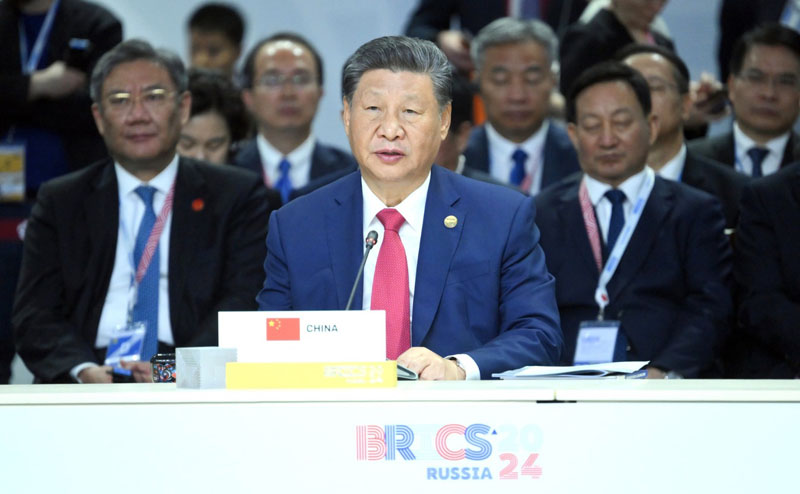 President of the People’s Republic of China Xi Jinping at an expanded meeting of the BRICS Summit.
President of the People’s Republic of China Xi Jinping at an expanded meeting of the BRICS Summit.
Photo: Kremlin.ru
To fully realise the potential of our growing economies and take advantage of the new wave of global economic growth, our countries need to strengthen cooperation in areas such as technology, education, efficient resource development, trade and logistics, finance and insurance. Additionally, we must significantly increase the scale of investments.
In this connection, we suggest establishing a new BRICS investment platform that would become a powerful tool for supporting our national economies and provide countries of the Global South and East with financial resources.
I would like to note that, this year, BRICS has managed to coordinate multiple initiatives aiming to accomplish critically important common objectives.
For example, this includes efforts to make supply and VAT chains more resilient, to counter protectionism, to expand e-commerce and to establish contacts between special economic zones.
We believe that launching a special mechanism for consultations between BRICS countries on issues related to the World Trade Organisation will help us chart a common position on formulating more equitable rules of the game in the global economy and overhauling the international financial system.
It is necessary to continue jointly promoting well-balanced approaches to issues linked with the global economy’s transition to low-emission development models and to counter attempts to use the climate agenda to oust rivals from the market. This is particularly true of emerging markets. The BRICS Contact Group for Climate and Sustainable Development is actively addressing these issues. We believe that BRICS’ initiatives on partnership regarding carbon markets and the climate research platform are highly promising.
BRICS countries are ramping up interaction in an effort to expand barrier-free e-commerce. The dynamic growth of online sales has increased the number of commercial disputes that need to be resolved promptly and fairly.
Russia’s chairmanship proposed sharing information about practices for launching online services to resolve e-commerce disputes with an eye towards creating joint framework procedures for pre-trial dispute resolution. I would also like to remind everyone about our initiatives to establish a BRICS Investment Arbitration Centre and to develop a convention on settling investment disputes, which will improve the protection of mutual investments.
The BRICS space is home to over 2,500 special economic areas. We believe it is important to establish direct links between management teams of these territories with preferential and easy-term regulations in order for them to exchange best practices on matters such as building logistics hubs, localising the industrial manufacturing, and creating favourable global competitive environment for investors.
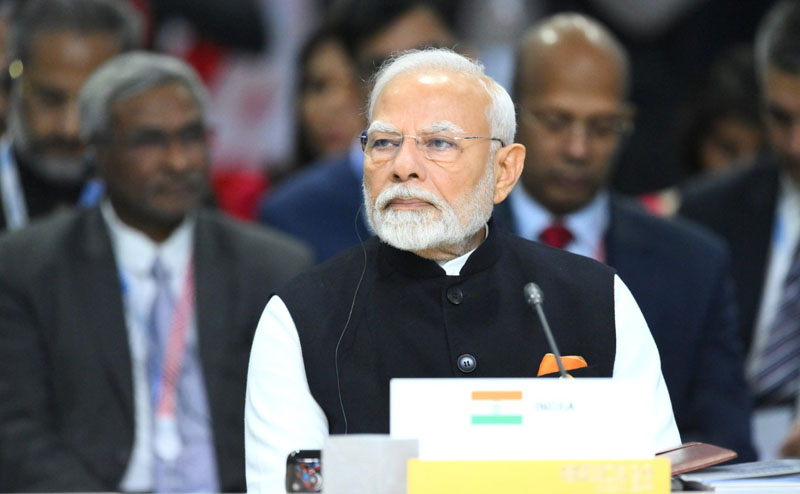 Prime Minister of India Narendra Modi at an expanded meeting of the BRICS Summit.
Prime Minister of India Narendra Modi at an expanded meeting of the BRICS Summit.
Photo: Kremlin.ru
Several BRICS countries are among the world’s largest producers of grains, leguminous crops, and oilseeds. In this regard, we proposed establishing a BRICS Grain Exchange, which would help discover fair and predictable prices for products and raw materials, since the latter have a special role to play in ensuring food security.
Once implemented, this initiative would help protect national markets from adverse external interference, speculation, and attempts to create artificial food shortages. Over time, we could also consider transforming the Grain Exchange into a fully-operational commodity exchange.
The contribution of BRICS countries to ensuring global energy security is undeniable. The association includes key energy producers and consumers. The joint energy research platform has been bringing good results as well.
Russia also advocates expanding cooperation in subsoil use. In July, the first meeting of the BRICS Geological Platform, which provided a venue for an expanded sharing of experience in mineral exploration and mining, took place in Moscow.
We believe it is quite practicable to create a separate BRICS platform for precious metals and diamonds, as this market is greatly overregulated by trade barriers in circumvention of the universal Kimberley Process Certification Scheme.
The BRICS Competition Law and Policy Centre has built a positive track record. We believe that we must continue working on this agenda, including by launching an interstate platform for promoting fair competition.
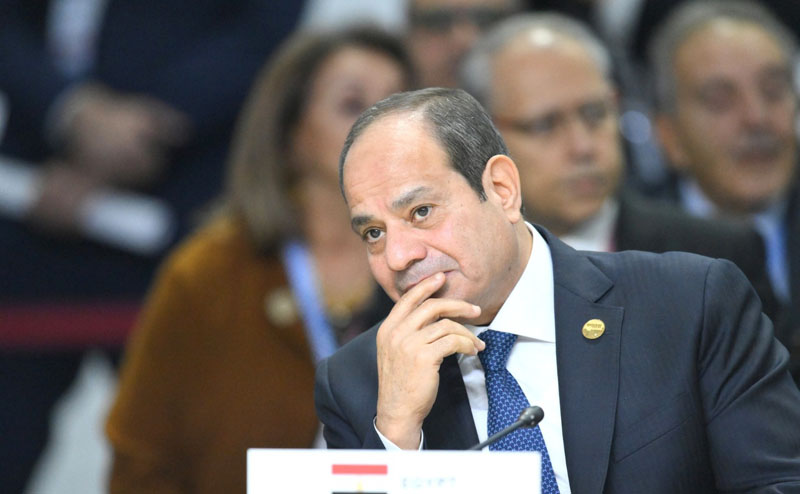 President of Egypt Abdel Fattah el-Sisi at an expanded meeting of the BRICS Summit.
President of Egypt Abdel Fattah el-Sisi at an expanded meeting of the BRICS Summit.
Photo: Kremlin.ru
In September, Moscow hosted a meeting of BRICS Tax Administration Heads and Experts. It was quite a success. Our colleagues discussed important proposals dealing with creating a website to promote cooperation within BRICS on tax-related matters, as well as an online platform for digitising tax services. Russia suggested establishing a permanent secretariat within BRICS on taxes which would operate on a rotational basis.
Efforts to enhance transport connectivity between our countries deserve special attention, since they offer us additional opportunities for expanding and diversifying mutual trade. This year, we started a dialogue on this topic within BRICS. By establishing subgroups on transport and logistics within the Business Council, we made sure that this dialogue continues on a regular basis.
We are also discussing future projects, such as creating a permanent logistics platform within BRICS, reviewing transport routes, creating an online communications platform for the transport sector, and establishing a reinsurance pool.
Having hosted a meeting of healthcare ministers in October, we have achieved meaningful progress in promoting BRICS cooperation in this sector. This meeting defined our long-term vision for healthcare-related matters.
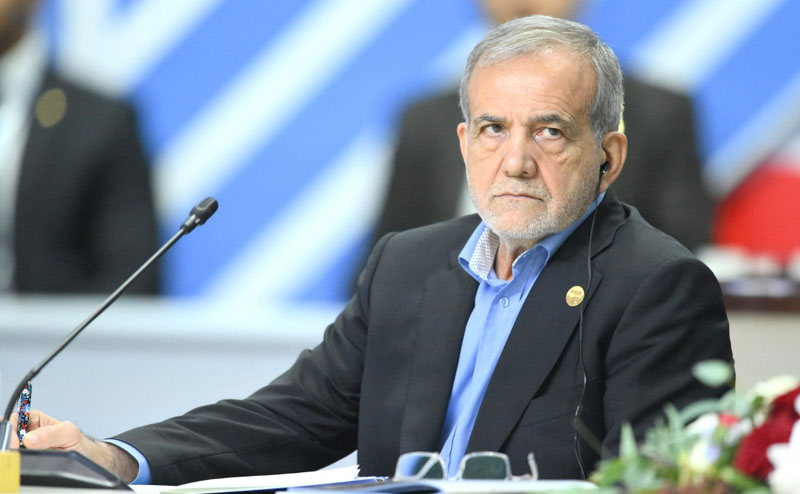 President of Iran Masoud Pezeshkian at an expanded meeting of the BRICS Summit
President of Iran Masoud Pezeshkian at an expanded meeting of the BRICS Summit
Photo: Kremlin.ru
We established a nuclear medicine group, which will promote cooperation in the production of innovative radiological agents and diagnostics. Held in St Petersburg, the first BRICS forum on nuclear medicine was quite useful in this regard.
We have launched an integrated early-warning system for addressing large-scale outbreaks of infectious diseases. Russia has also put forward an initiative to create a BRICS research network on public health so that we can benefit from each other’s best practices for strengthening our national healthcare systems. It is essential that we persist in our efforts to develop and expand the Vaccine Centre and the Tuberculosis Research Network within BRICS.
On a separate note, I would like to mention the publication of the BRICS medical journal’s first edition, which offers a platform for doctors, researchers and medical students to publish their innovative ideas.
BRICS cooperation in science and technology significantly contributes to bridging the global digital divide and advancing artificial intelligence, alongside other emerging technologies.
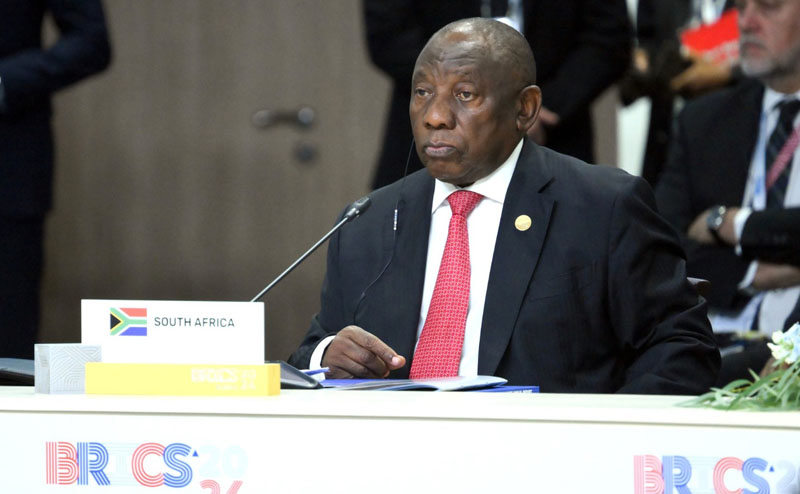 President of South Africa Cyril Ramaphosa at an expanded meeting of the BRICS Summit.
President of South Africa Cyril Ramaphosa at an expanded meeting of the BRICS Summit.
Photo: Kremlin.ru
I would like to underscore Russia's proposal to establish a BRICS alliance in the realm of artificial intelligence. This initiative aims to regulate artificial intelligence technologies, including measures to prevent their unlawful use. In Russia, the business community has adopted a code of ethics in this area, which could be joined by our BRICS partners and other nations.
We welcome the arrangements on common approaches to the formation of a system of scientometric databases, as well as the expansion of cooperation areas and the number of participants in the Network University.
I should also mention the decision to establish BRICS Geographer's Day, which will now be celebrated annually on August 18. A scientific expedition to the nature reserves of the Krasnoyarsk Region and the Republic of Khakassia in Russia has already been scheduled to coincide with this date.
During Russia's chairmanship, we placed special emphasis on the development of contacts in the cultural and humanitarian sphere. The International Film Festival and the BRICS Cultural Festival were successfully held, and the Alliance of Folk Dance and the Association of Film Schools were established.
Large-scale BRICS Sports Games have proved to be a valuable initiative. This year, Kazan hosted the fifth such games across 27 sports. For the first time, they were organised in an open format, with athletes not only from BRICS countries but also from more than 80 other countries participating in the competition. These Games clearly demonstrated that Russia possesses a modern infrastructure base and manpower potential to organise major world-class sporting events. To further develop the BRICS Games, we propose devising a special intergovernmental programme and establishing a coordinating authority to implement projects in the field of physical fitness and sports.
This year, inter-parliamentary dialogue within the framework of the group has significantly intensified. A new format for meetings of chairpersons of legislative committees on international affairs has been established.
Broad prospects are emerging for cooperation among regions, cities, and municipalities. During the thematic forums held in Moscow, Nizhny Novgorod, and Kazan, discussions were held on the prospects for collaboration in the sphere of sustainable development of municipalities, efficient management of the urban economy and infrastructure, and increasing the accessibility of urban services.
Colleagues,
I thank you for your attention and invite my colleagues to express their views on the above-mentioned outcomes of the work on the economic and humanitarian tracks.”
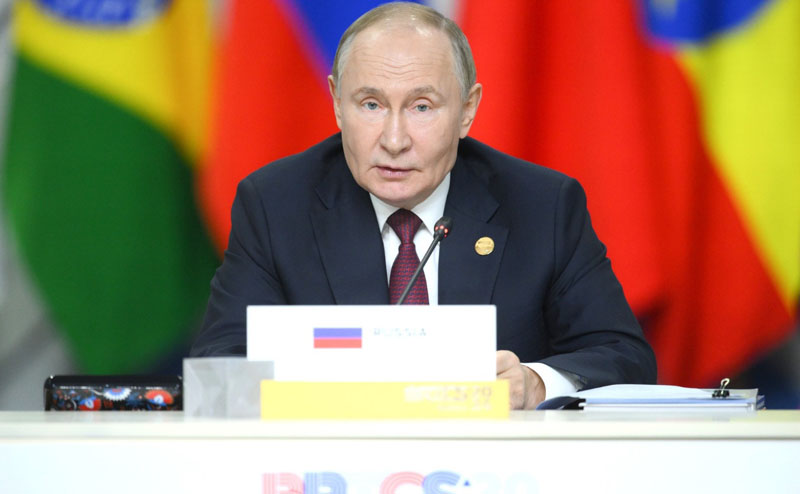
Vladimir Putin:
“Once again, I would like to thank you for your substantive contributions and for this insightful and interested discussion.
We had a detailed conversation on setting our priorities in terms of forging a stronger strategic partnership within BRICS and went on to outline our plans for future cooperation. In fact, we share close or convergent positions on most topical global and regional matters.
It is essential that all BRICS partners remain committed to working closely together to create a more democratic, inclusive and multipolar international system. We have a shared understanding of the fact that together we can undertake the most ambitious and large-scale projects and initiatives.
We heard interesting reports from the heads of BRICS financial and business structures. As a founding member of the New Development Bank, Russia wants it to expand its project activities in all the countries which have the status of NDB shareholders and in the countries of the Global South and East.
We support the BRICS Business Council’s proactive efforts to promote cooperation among our major corporations, as well as SMEs in trade, manufacturing, agriculture, energy and transport.
In addition, we believe in the importance of working together within the BRICS intrabank cooperation mechanism as a way to combine our efforts in supporting economic projects dealing with essential social matters, undertaking regional development programmes and building infrastructure. Creating incentives for using national currencies in trade and investment remains high on our agenda.
Of course, we all praised the BRICS Women’s Business Alliance, created with the purpose of assisting women in promoting business, facilitating contacts and implementing promising projects.
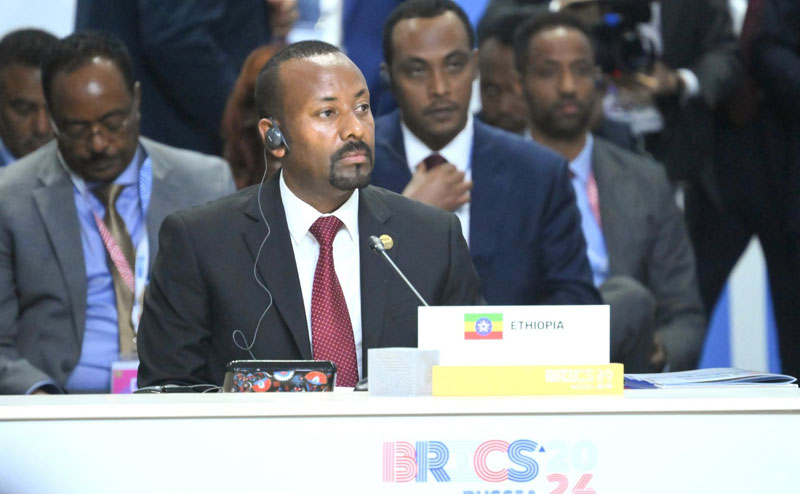 Prime Minister of Ethiopia Abiy Ahmed at an expanded meeting of the BRICS Summit.
Prime Minister of Ethiopia Abiy Ahmed at an expanded meeting of the BRICS Summit.
Photo: Kremlin.ru
Overall, very good results have been reported for cooperation between BRICS countries this year. Jointly, we have advanced in all three dimensions – politics and security, the economy and finance, and cultural and humanitarian contacts. We have laid solid groundwork for the future.
The final declaration, which has been prepared for our approval, reflects our common views on the global situation, the results of Russia’s BRICS Chairmanship, and the guidelines for our interaction in the long term.
I would like to ask our colleagues once again if they have any objections or remarks regarding this declaration. If not, I propose we consider the declaration adopted. I would also like to add that we plan to circulate it at the UN as our common document.
It has already been noted that Brazil will assume the BRICS Chairmanship next January. I am confident that Brazil’s chairmanship will ensure continuity in the work of our group while also supplementing our cooperation with interesting new initiatives and ideas. All of us will provide all-round assistance to our Brazilian friends.
In conclusion, I would like to thank you once again for our constructive and fruitful joint work and to declare the expanded meeting of the BRICS Summit closed.
Tomorrow, we will hold a BRICS Plus/Outreach format meeting to discuss the current aspects of our group’s interaction with many other Global Majority countries. This evening, I invite you to a reception, which will also be attended by the delegations that will take part in the joint meeting tomorrow. The time before the reception can be used for bilateral meetings.
I would like to thank you again for our joint work. Thank you very much.”
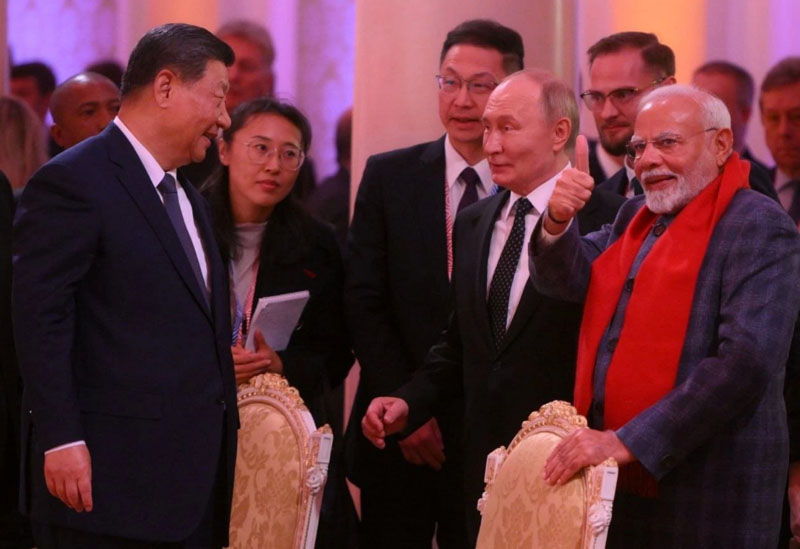 Vladimir Putin, Xi Jinping and Narendra Modi at the BRICS Summit.
Vladimir Putin, Xi Jinping and Narendra Modi at the BRICS Summit.
Photo: RIA Novosti
Kazan Declaration has been adopted following the 16th BRICS Summit
read more in our Telegram-channel https://t.me/The_International_Affairs

 19:46 23.10.2024 •
19:46 23.10.2024 •























